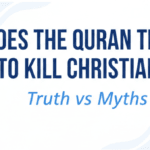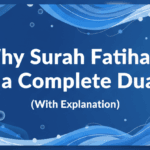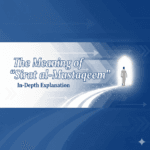Starting With The Name Of Almighty Allah
The Quran is the holy scripture of Islam – We Muslims believe, it is the word of God revealed to the Prophet Muhammad. In Arabic, “Quran” (القرآن) literally means “the recitation,” reflecting its origin in oral revelation. It contains 114 chapters (suwar) of varying lengths, composed in eloquent rhymed prose. Muslims revere the Quran as a complete code of conduct and guidance. For example, the Quran refers to itself as a guide for mankind (e.g. Surah 2:185) and emphasizes submission to One God. In fact, the Quran repeatedly stresses monotheism: it proclaims
“And your Lord is One Lord; there is none who has the right to be worshipped but He”
(Surah 2:163)
This underscores the core Islamic belief in Allah’s oneness. For more on its linguistic and historical depth, see “What is the Meaning of the Word ‘Quran’?”
Muslims believe the Quran to have been revealed over about 23 years (610–632 CE) through the angel Gabriel to Muhammad. Muhammad himself was not the author; tradition holds he was illiterate and served only as a conduit. His companions, many of whom memorized or wrote down verses, later collected these revelations into a written text. After Muhammad’s (P.B.U.H) departure, Caliph Abu Bakr ordered the first compilation of the Quran, and the third Caliph Uthman standardized its text into the Uthmanic codex. The Quran itself denies any claim that Muhammad authored it, and notes his inability to write. Thus, “the completed Quran was never written down in its entirety” during Muhammad’s lifetime; his successors compiled it from both written fragments and memorization. Today’s modern research, such as carbon dating of early manuscripts (e.g. Birmingham manuscript dating to 568–645 CE), tends to support the traditional account that the Quran has remained unchanged since the 7th century.
Understanding the Quran’s guidance becomes easier when one learns it directly from qualified teachers. That is why many students now prefer Online Classes of Quran to build both knowledge and practice.
Structure of the Quran
The Quran’s literary style blends poetry and prose; it uses rhythmic and phonetic patterns that aid memorization and reflection. Many surahs contain Muqattaʿāt (disconnected letters) at the start (e.g. Alif, Lam, Meem), whose precise meaning is debated. For ease of recitation, the Quran is also divided into thirty equal parts (juz’), each one can be read in a day of Ramadan. There are additional divisions (half-juz’, manzil, rukūʻ etc.) and thematic rukus (paragraphs). In sum, the Quran’s structure is unique: it was carefully preserved, not as a literary narrative but as a collection of revelations and guidance.
- The Quran is arranged into 114 chapters (suwar), each composed of verses (ayat).
- It is not organized chronologically; rather, by tradition its chapters are arranged roughly in order of decreasing size, though some shorter chapters appear at the end.
- Each surah (except Surah no. 9) begins with the phrase “Bismillah al-Rahman al-Rahim” (“In the name of God, the Most Compassionate, Most Merciful”).
- Chapters are classified as Meccan or Medinan based on when Muhammad received them (before or after the Hijrah).
- In total, the standard (Hafs) version has 6,236 verses and around 77,400 Arabic words.
To truly grasp these structural details, learners benefit from interactive teaching methods. With modern Online Quran Classes, it is possible to study these divisions step by step from anywhere in the world.
For more on its organization and preservation, see How Was the Qur’an Preserved? The Story of the Qur’an’s Compilation into a Single Book and The Role of Caliph Uthman in Standardising the Qur’an.
History of the Quran
The history of the Quran begins with Muhammad’s first revelation in 610 CE at the Cave of Hira. Over the next 23 years he received verses on various occasions. These verses were initially passed on orally and inscribed on available materials (leaves, parchment, bones). A growing community of followers memorized and taught the revelations. It was common for Quraysh tribesmen to learn to write after the Battle of Badr, enabling written recording of verses. Importantly, Muhammad did not compile a single written mushaf himself; he would recite what was revealed when leading prayers. This tradition of memorization continues strongly even today. Many Muslims join Quran Learning Classes to follow the legacy of early companions who preserved the Quran through recitation.
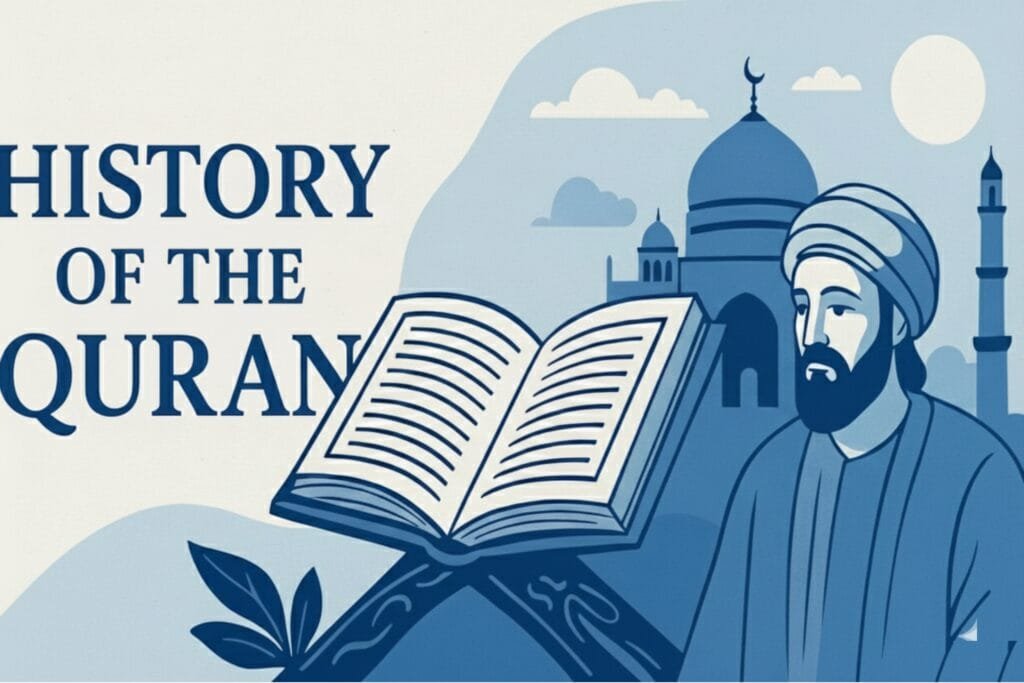
After Muhammad’s (P.B.U.H) departure in 632 CE, the first Caliph Abu Bakr gathered the Quran into a codex to prevent loss (many reciters had died in battle). Zayd ibn Thabit and others compiled the fragments into one volume. Later, Caliph Uthman (644–656 CE) ordered copies of this compilation be standardized and distributed, as variants had appeared. This Uthmanic codex is considered the archetype of today’s Quran. Any differences between readings are minor and well-studied. See When was the Quran Published? Who Compiled the Quran into A Book? and Misconceptions About the Compilation of the Holy Quran for a deeper look into these events.
Remarkably, despite numerous manuscripts and fragment discoveries, the text of the Quran shows extraordinary consistency. In 2015, radiocarbon analysis of a Quran manuscript at Birmingham University dated the parchment to Muhammad’s era. The wording matched modern copies, giving weight to the belief of Muslims that “the Quran remains unchanged since the seventh century.” For traditional scholars, this perfection is by divine promise, which is discussed in works like Why is Quran considered perfectly preserved?. Academically, historians note that early textual witnesses converge on a single Islamic scripture by the end of the 7th century.
Meaning and Central Message Of Quran
At its core, the Quran proclaims monotheism and guidance. Its central message is that there is only one God (Allah), and that humans must live according to His guidance through prophets. Indeed, many verses (and entire chapters) emphasize Tawhid, the Oneness of God. Allah is described as Creator and Sustainer of all, as the verse says:
“Your Lord is one God; there is none worthy of worship but He”
(2:163).
The Quran calls itself al-Furqān (“the Criterion”), meaning it distinguishes truth from falsehood, and al-Hudā (“the Guide”).
Another overarching concept is accountability and the Hereafter. The Quran repeatedly reminds readers that life is a test. For example, one passage declares:
“Every soul shall taste death, and then to Us you will be returned”
(29:57)
This underscores that ultimate justice and reward await in the afterlife. It warns that every deed will be brought forth on Judgment Day. In short, ethical conduct and faith in God are intertwined, with the promise of paradise and the threat of hell as motivation.
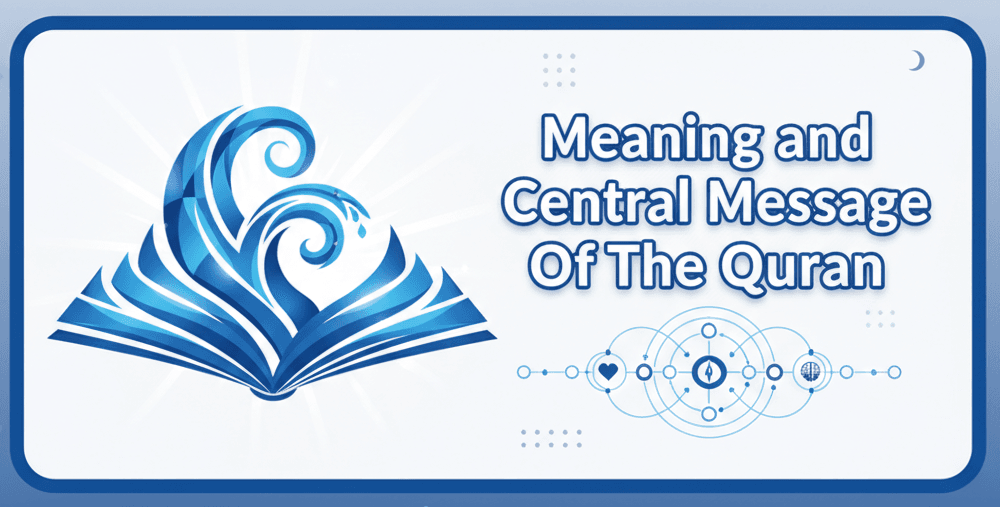
The Quran also emphasizes worship and moral virtues. It commands justice, charity, honesty, and kindness. For instance, it urges:
“Indeed, Allah orders justice, the doing of good…”
(Quran 16:90)
Believers are instructed to pray, give alms (zakat), fast in Ramadan, and perform the pilgrimage, integrating devotion into daily life. The Prophet Muhammad taught,
“The best among you are those who learn the Quran and teach it.”
Thus another major theme is knowledge and learning: the Quran is seen as a source of wisdom for personal and social life, and acquiring its knowledge is virtuous.
Following this Prophetic teaching, Muslims worldwide engage in Quran Classes Online to strengthen both recitation and understanding while living in different cultural settings.
Major Themes in Detail
- Monotheism (Tawhid) and God’s Attributes
The Quran centers on the oneness of God. It describes Allah as merciful, compassionate, all-knowing and just.
- Prophets and Revelation
The Quran recounts stories of earlier prophets (Adam, Noah, Abraham, Moses, Jesus, etc.) to illustrate the consistent message of monotheism and righteousness. The Quran is seen as the culmination of God’s revealed scriptures (including Torah, Psalms, and Gospel). It clarifies aspects of earlier revelations and confirms the continuity of divine guidance. For an interfaith context, see Is the Quran the same as the Bible?.
- Ethics and Social Justice
Many Quranic passages address human conduct and society. They forbid oppression, corruption and immorality, while enjoining honesty, fairness, and charity. Learning these values practically requires proper guidance. An Online Quran School helps learners apply Quranic ethics to daily life with structured lessons.
- Life, Death, and the Hereafter
The fleeting nature of life and the reality of death are constant motifs. To reflect deeply on these reminders, many people enroll in Quran Online Courses where scholars explain how the afterlife shapes our present choices.
- Guidance and Wisdom
The Quran portrays itself as “al-huda” (the Guide) and “dhikr” (remembrance). It contains parables, wisdom sayings, and moral lessons.
To understand these stories and their wisdom, students often turn to an Online Quran Academy where teachers explain the context behind each revelation.
Islamic and Academic Perspectives
Muslims view the Quran as divine speech, perfect and protected from error. This traditional belief is supported by centuries of scholarship and the practice of hifz (memorization), which has preserved the text.
Academic scholars, whether believers or not, study the Quran using historical and textual methods. They note that the Quran was transmitted both orally and in writing, and they analyze variant readings and early manuscripts (like the Ṣan‘ā’ finds or the Kufic fragments). Historians typically accept that Muhammad did not personally write the final text. They see Caliph Uthman’s compilation as a historical process to unify disparate recitations, which aligns with Islamic tradition. Some non-Muslim researchers might compare the Quran’s compilation with the development of other religious texts; for instance, questions are raised like “Which is more accurate, the Bible or the Quran?”. See also What the Quran says about the Bible for deeper exploration.
This balance of traditional and modern study methods is vital. Today, Quran Online Lessons make it possible for anyone to access authentic teaching without geographic limits.
Najam Academy – Your Online Quran School
Najam Academy is a premier educational center specializing in Quranic studies, based primarily in the USA and UK (with a global reach). We are committed to offering affordable, high-quality instruction in Quran recitation, memorization, and understanding. Our programs are designed with evidence-based methods to build confidence and spiritual growth. Whether you are a beginner or an advanced student, Najam Academy’s team of experienced tutors will guide you through the Quran’s teachings. Join Najam Academy’s Online Quran Classes and experience interactive learning in a supportive environment.

